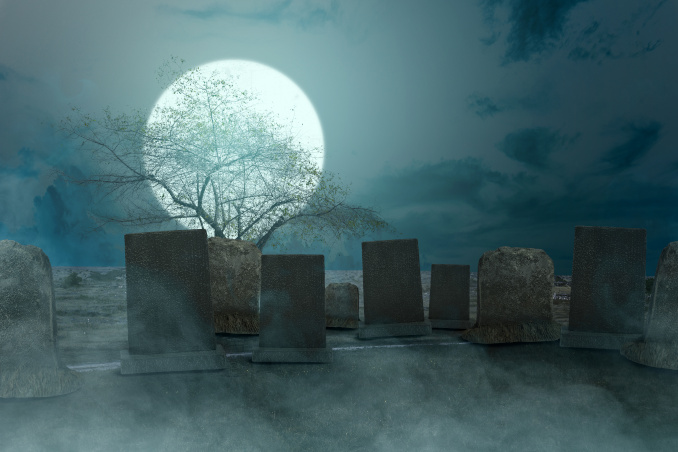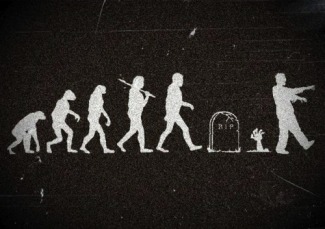They’re coming to get you Barbara ~ Night of the Living Dead
By Justin Boldenow, Solari Report production assistant
There seems to be an unstoppable force that is spreading, growing, and changing people. The brain isn’t the same once this force has taken hold and your friends won’t think of you the same after you’re contaminated. No I’m not talking about a real zombie apocalypse, I’m talking about the Zombie Culture Phenomenon.
Before we delve into the Zombie Culture, first we should ask:
‘What is a zombie?’
There are many different definitions, behaviors, and perspectives to what makes up a zombie. But one clear fact remains in all cases. It’s an animated corpse.
The word ‘Zombie’ gets its roots from African Voodoo. The first Zombies stem from the belief that a corpse could be controlled using magic and that only the person who raised them could control them. This idea has evolved and changed throughout history and has become something very different to a modern audience. The present day concept of a zombie has no self-awareness or any real intelligence as far as what we consider intelligence. It doesn’t think, it doesn’t feel, and it has no personality (with the exclusion of some modern interpretations). A zombie is driven from its first primal instinct which is to hunt and devour and though it does not need food for sustenance or nutrition, it is compelled to eat living humans for no other reason than the desire to consume. Also, it can only be killed by destroying its brain. George A. Romero who has been coined the “Godfather of Zombies” capitalized on the zombie genre with the 1968 black and white release of ‘Night of the Living Dead.’ Though this film was not the first zombie movie, as they were being made as early as 1932 with ‘White Zombie,’ Romero established the standard to which zombies have been thought of to this day. The zombie was a satirical analysis of human nature. The undying need to consume and the brainless activity that we do every day. Zombies in Romero movies travel in hordes as most people feel the need to belong to a group. Zombies collect near shopping centers and are drawn to places of entertainment and consumption as they seem to have some small glimpse of memory from their living lives
‘Where do Zombie’s come from and what does their existence lead to?’
In media stretching from comic books and cartoons to films and novels, zombies have had many different sources of origin. In ‘Night of the Living Dead’ the event that starts it all is when a radiation-emitting satellite returning from Venus crashes upon the Earth. In such movies as ’28 days later’ the zombies come from a laboratory-created virus where as in “Wasting Away” the zombies were developed as a military means of having super soldiers. Nuclear fallout has been cited as the source in such games as ‘Fallout’ as well as many other movies. Then in such comedies as ‘Zombieland’ the plague is kicked off by a fast food restaurant that had a bad batch of beef and the virus was a new strain of mad-cow disease. In Romero’s ‘Dawn of the Dead’ one of the main protagonists says that the zombies have come because “There’s no room left in hell.”
In any case, the results are the same. The zombies can only be stopped by damaging and destroying the brain. In most cases the entire world is contaminated through the air and as soon as someone dies they become a zombie. The process is made faster by being deliberately infected by means of a bite or scratch. Then the virus takes hold and changes a person within minutes to 24 hours depending on the writers. The infection spreads globally till all civilized function stops. Government is gone, manufacturing has ceased, and the world is crawling with undead hordes. This leaves a few small bands of survivors who are left traveling and learning agriculture to survive. Most of the survivors have resorted to total anarchy and good-hearted people are left to fear both the living and the dead. In some cases new cities with strong fences become established and civilization restarts on the foundation of a previous age’s ruins.
Zombies around the world, Pop culture, and ‘Why do people love zombies?’
Zombie movies have had a large audience in every generation since it’s beginning in the 30’s. In it’s cinematic origins it was the terror of the dead coming back, the perversion of the afterlife. In the 60’s and 70’s there came the rise of Grindhouse movies, drive-in horror movie double features, and the love of B-rated gory horror flicks. They were cheesy, ridiculous, and fun to watch as well as cheap to make. In the 80’s with movies like ‘Return of the Living Dead,’ we have a comedic element that makes fun of the whole genre while still being part of it. A means of laughing at itself. In the 90’s the zombie genre was brought back to it’s terrifying and real content with its crossing over into video games. Starting the new genre of ‘Survival Horror’ games, ‘Resident Evil,’ ‘Silent Hill,’ then later ‘Left 4 Dead,’ ‘Dead Rising,’ and many other titles featured a first person perspective in which the player now had to survive a zombie apocalypse or undead-like force.
What is interesting is that Zombie movies and culture have spread all over the world. ‘Resident Evil’ and ‘Silent Hill’ are games that came to us from Japan. The Japanese have their own concept of what makes up a zombie in the games that still tie in many ways to Romero’s version. Then in the Japanese movie ‘Versus’ we have a spiritual element of zombies who are the souls of the dead who posses plant life. ’28 Days Later’ comes to us from the UK. Zombie flash mobs can be found on every college campus in the U.S. and Zombie survival elements have been added as bonus material in almost every major video game release such as ‘Red Dead Redemption,’ ‘Fallout,’ ‘Borderlands,’ and ‘Call of Duty.’ Zombies have made it into modern novels such as Max Brook’s ‘World War Z,’ and ‘Pride and Prejudice and Zombies’ by Seth Grahame-Smith. But more than that, the love of zombies can be strongly shown in such music videos as these:
Zombie culture can be found in such bars and restaurants as Donnie Dirk’s Zombie Den in Minneapolis, and drinks like Red Zombies found at Red Robin. Zombie survival war games are held in paintball competitions around the world as well as Humans vs. Zombie flag games in major cities. Most High school students are better prepared for a zombie apocalypse then they are for college or life outside of their parents.
This picture of global anticipation and planning takes on even more meaning when we see such books as “The Zombie Survival Guide” by Max Brooks in 2003 and ‘Preparedness 101: Zombie Apocalypse.’ The CDC has even gone as far as to make a ‘Zombie Task Force’ in preparation of a zombie apocalypse.
The final point that I want to make is the philosophical implications of zombie culture. Why do people like me love this stuff and what does it mean? One could say that the reason people love zombie movies so much is because of our instinctual and repressed desire to kill. And they would be partially right. Like the days of Rome where people fought to the death for entertainment, the desire to shoot an undead human in the head can be strong to some. It’s hard to argue that there aren’t people out there that like this for those reasons. Afterall, Zombies aren’t really human, right? This philosophical debate is really brought into life with the incredible television series based on the graphic novels and named after the 1936 classic, ‘The Walking Dead’ where at one point the character Marshall keeps a horde of zombies locked up because he views them as sick people, that they can be healed once the cure is found. At this point in the series government is gone and the CDC is completely abandoned. The main protagonist ends up killing them once they’re accidentally released in order to preserve the safety of his family. So in the end, who was right? Above all this I believe that the key love of zombie movies goes beyond the fun, beyond the ridiculous plots, cheezy special effects, and blood and gore. It goes beyond the desire to hunt down undead humans. I truly believe that the reason many attach themselves to this genre of cinema is because one general theme that stands out is that against all oppression, against all odds, mankind will survive and mankind will look out for one-another and their families. The core of human nature and family values stands out like a beacon in a desperate and perverted world.
Related Reading:
-
Zombie
Wikipedia
Zombie (fictional)
Wikipedia
Zombie Apocalypse
Wikipedia
George A. Romero
Wikipedia
List of Zombie Films
Wikipedia
Max Brooks and the Zombie Survival Guide
Maxbrookszombieworld.com
Preparedness 101: Zombie Apocalypse
CDC
Walking Dead (disambiguation)
Wikipedia


